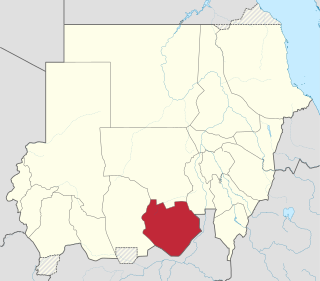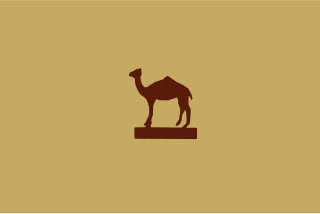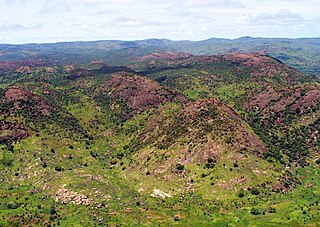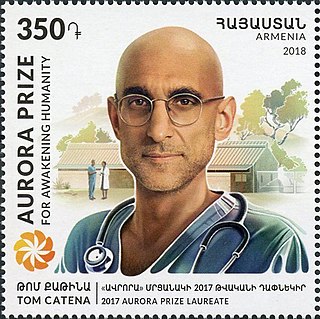Related Research Articles

The Kordofanian languages are a geographic grouping of five language groups spoken in the Nuba Mountains of the Kurdufan, Sudan: Talodi–Heiban languages, Lafofa languages, Rashad languages, Katla languages and Kadu languages. The first four groups are branches of the Niger–Congo family, whereas Kadu is now widely seen as a branch of the Nilo-Saharan family.

South Kordofan is one of the 18 wilayat or provinces of Sudan. It has an area of 158,355 km² and an estimated population of approximately 1,100,000 people (2000). Kaduqli is the capital of the state. It is centered on the Nuba Hills. At one time it was supposed that South Kordofan was the only state in (North) Sudan suitable for producing oil, but oil has also been discovered in neighboring White Nile State in larger quantities.

Lokichogio, is a town in the Turkana District in northwest Kenya. It is often called Loki for short. The town lies on the A1 road, and is served by the Lokichogio Airport.

Kordofan is a former province of central Sudan. In 1994 it was divided into three new federal states: North Kordofan, South Kordofan and West Kordofan. In August 2005, West Kordofan State was abolished and its territory divided between North and South Kordofan States, as part of the implementation of the Comprehensive Peace Agreement between the Government of Sudan and the Sudan People's Liberation Movement. West Kordofan was reestablished in July 2013.

The Nuba Mountains, also referred to as the Nuba Hills, is an area located in South Kordofan, Sudan. The area is home to a group of indigenous ethnic groups known collectively as the Nuba peoples. In the Middle Ages, the Nuba mountains probably had been part of the Nubian kingdom of Alodia. In the 18th century, they became home to the kingdom of Taqali that controlled the hills of the mountains until their defeat by Mahdi Muhammad Ahmad. After the Mahdi's defeat by the British, Taqali was restored as a client state. Infiltration of the Messiria tribe of Baggara Arabs has been influential in modern conflicts.

The Nuba peoples are various indigenous ethnic groups who inhabit the Nuba Mountains of South Kordofan state in Sudan, encompassing multiple distinct peoples that speak different languages which belong to at least two unrelated language families. Estimates of the Nuba population vary widely; the Sudanese government estimated that they numbered 1.07 million in 2003.
Nuba fighting is done by the Nuba peoples in the Nuba Mountains of South Kordofan state, in northern Sudan. It involves both stick fighting and wrestling.

The Temein languages, or Nuba Hills languages, are a group of Eastern Sudanic languages spoken in the Nuba Mountains of Sudan.
The Shatt language is an Eastern Sudanic language of the Daju family spoken in the Shatt Hills southwest of Kaduqli in South Kurdufan province in southern Sudan. The designation "Shatt" is an Arabic word meaning "dispersed" and is applied to several distinct groups in the Nuba Mountains. "Caning" is their own name for themselves.
Yousif Kuwa Mekki (1945–2001) was a Sudanese revolutionary, rebel commander and politician.

The Last of the Nuba is the English-language title of German film director Leni Riefenstahl's 1973 Die Nuba, an illustrations book published a year later in the United States. The book was an international bestseller and was followed-up by the 1976 book Die Nuba von Kau. It was the subject of a famous critique by Susan Sontag in claiming that it adhered to a fascist aesthetic.
The Keiga people are a sub-ethnic group of the Nuba peoples in the Nuba Mountains of South Kordofan state, in southern Sudan. The population of this ethnicity likely is below 10,000. They speak Keiga, a Nilo-Saharan language. The language belongs to the Kadugli–Krongo family.
Moro is a Niger–Congo language in the Heiban family spoken by the Moro people in the Nuba Mountains of Kordofan, Sudan.
Lumun (Lomon), also Kuku-Lumun, is a Niger–Congo language in the Talodi family spoken in the Nuba Mountains, Sudan.
Abdelaziz Adam Al-Hilu is a Sudanese politician and the current chairperson of the Sudan People's Liberation Army SPLA-North
Liguri, or Logorik, is an Eastern Sudanic language of the Daju family spoken by the Logorik people in the Liguri Hills of the Nuba Mountains, northeast of Kaduqli in South Kurdufan province in southern Sudan.
Jalila Khamis Koko is a Sudanese teacher and activist. In March 2012, she was detained by the Sudanese National Intelligence and Security Service (NISS) and accused of treason. After a 10-month detainment, she was released in January 2013. In December 2013, Khamis was awarded the Delegation of the European Union to Sudan's "Heroes for Human Rights Award 2013".

The mining industry of Sudan was mostly driven by extraction fuel minerals, with petroleum accounting for a substantial contribution to the country's economy, until the autonomous region of Southern Sudan became an independent country in July 2011. Gold, iron ore, and base metals are mined in the Hassai Gold Mine. Chromite is another important mineral extracted from the Ingessana Hills. Other minerals extracted are gypsum, salt, and cement. Phosphate is found in Mount Kuoun and Mount Lauro in eastern Nuba. Reserves of zinc, lead, aluminium, cobalt, nickel in the form of block sulfides, and uranium are also established. Large reserves of iron ore have been established.

Thomas (Tom) Catena is an American physician who has been practising in Gidel in the Nuba Mountains of Sudan since 2008. On May 28, 2017 he was awarded the second annual Aurora Prize for Awakening Humanity, receiving a $100,000 grant and an additional one million dollars for him to distribute to three humanitarian organizations. He has been likened to the 20th-century medical missionary Albert Schweitzer. The New York Times has published instructions on how to donate to Catena.

The Nuba Mountains, located in the West Kordofan and South Kordofan states in the south of Sudan, are inhabited by a diverse set of populations speaking various languages not closely related to one another.
References
- 1 2 "Hospital in Nuba Mountains losing nurses to INGOs in Yida | Radio Tamazuj". radiotamazuj.org. Archived from the original on 2015-07-03. Retrieved 2015-07-02.
| This Sudan location article is a stub. You can help Wikipedia by expanding it. |